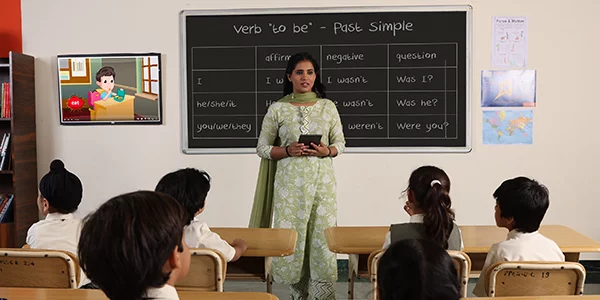Accelerate Learning with Primary Science Tuition Singapore for Young Minds
Accelerate Learning with Primary Science Tuition Singapore for Young Minds
Blog Article
Checking Out the Different Mentor Techniques in Primary Science Education Today
Inquiry-based learning, hands-on experiments, and the combination of modern technology are redefining exactly how educators engage young minds. In addition, joint methods and set apart direction are being utilized to provide to the varied requirements of students, improving both engagement and understanding.
Inquiry-Based Understanding
Inquiry-Based Knowing (IBL) is a pedagogical approach that motivates students to discover scientific concepts through doubting, examination, and hands-on experimentation. This method highlights the role of pupils as active individuals in their discovering, promoting crucial thinking and analytical skills. By involving with real-world questions, pupils become motivated and interested, which enhances their understanding of scientific principles.
In IBL, teachers function as facilitators, assisting students as they navigate their questions instead than supplying info straight. This student-centered method allows for distinction, accommodating different finding out rates and styles. Pupils establish abilities in creating hypotheses, designing experiments, and analyzing information, which are critical for scientific proficiency.
Furthermore, IBL cultivates cooperation amongst trainees, urging them to share searchings for and ideas. This cumulative inquiry promotes social abilities and a feeling of area within the class. Additionally, the procedure of inquiry motivates durability, as pupils discover to embrace failing as a stepping rock towards understanding.
Hands-On Experiments
Hands-on experiments are a crucial element of efficient scientific research education and learning, enhancing the concepts of inquiry-based knowing. These experiments permit trainees to engage directly with scientific concepts, fostering a deeper understanding through experiential understanding. By manipulating materials and observing end results, young students can realize abstract concepts in concrete means.
Such tasks promote crucial reasoning and analytical skills, as pupils hypothesize outcomes, conduct experiments, and evaluate results. This process urges them to ask concerns, fine-tune their understanding, and create a clinical mindset. Hands-on experiments can be customized to diverse knowing designs, making certain that all trainees have the opportunity to engage meaningfully with the material.
In addition, hands-on experiments often urge collaboration among peers, advertising synergy and communication abilities. Working in teams enables pupils to share concepts, review findings, and pick up from each other, which improves their overall academic experience.
Including hands-on experiments right into the key science educational program not only enhances the discovering setting however additionally cultivates a long-lasting interest in science. By actively joining their education, trainees are more most likely to create a passion for clinical questions that prolongs past the classroom.

Modern Technology Integration
Integrating modern technology right into primary science education has become significantly essential in cultivating pupil interaction and enhancing learning outcomes. Making use of electronic tools, such as interactive simulations, online labs, and instructional software program, supplies students with chances to check out scientific concepts in cutting-edge means. These resources help with a much deeper understanding of intricate subjects by allowing learners to envision and adjust variables that would certainly be not practical in a conventional classroom setting.
Additionally, modern technology combination encourages customized discovering experiences. Students Continue can proceed at their own speed, reviewing difficult concepts through multimedia resources, which satisfy various understanding styles. This adaptability not only sustains private growth but likewise cultivates a feeling of autonomy in learners.
Additionally, modern technology functions as a bridge to real-world scientific research, connecting trainees with present research study and professional payments. Access to clinical journals and online databases widens students' viewpoints on scientific query and cultivates essential assuming skills.
Collaborative Knowing
Collective knowing plays a crucial role in key science education and learning by promoting team effort and communication skills among pupils. This strategy encourages students to collaborate, share expertise, and involve in analytic, which improves their understanding of clinical ideas. By taking part in group tasks, students discover to express their concepts, listen to varied viewpoints, and negotiate services, all of which are crucial abilities in both academic and real-world contexts.

Study suggests that collective understanding can lead to boosted inspiration and interaction in science subjects, as students locate satisfaction in common experiences (primary science tuition Singapore). Additionally, this strategy prepares pupils for future joint endeavors, equipping them with the skills essential for reliable team effort in college and professional environments. Ultimately, welcoming joint understanding in primary scientific research education can significantly enhance the learning experience and advertise a deeper understanding of clinical questions
Differentiated Instruction

Differentiated instruction can manifest in numerous ways, such as varying the content, procedures, or products of understanding. Teachers might make use of look at this now tiered tasks that offer varying degrees of intricacy, permitting pupils to function at their corresponding preparedness levels. Additionally, versatile organizing techniques can promote cooperation amongst pupils with different capacities, cultivating peer knowing.
Analysis plays an important role in this approach, as it notifies direction and aids teachers recognize each student's unique needs. Formative assessments, such as tests and monitorings, can direct educators in changing their strategies to boost discovering outcomes. primary science tuition Singapore. Inevitably, by applying set apart guideline in key scientific research education, teachers can cultivate a much more efficient and fair learning atmosphere, empowering all students to reach their complete possibility in understanding scientific phenomena
Final Thought
In recap, the varied mentor methods in key scientific research education, consisting of inquiry-based discovering, hands-on experiments, technology combination, joint understanding, and distinguished guideline, collectively contribute to a much more efficient discovering setting. These techniques advertise vital reasoning, problem-solving abilities, and a much deeper comprehension of clinical ideas. By carrying out these strategies, teachers can create interesting and supportive classrooms that address the diverse requirements of pupils, ultimately cultivating a long-lasting interest in scientific research and boosting academic achievement.
Inquiry-Based Understanding (IBL) is an instructional approach that urges pupils to discover scientific ideas via questioning, examination, and hands-on testing.Collaborative discovering plays an essential duty in key science education by cultivating synergy and interaction abilities among trainees.Research study indicates that collective knowing can lead to raised inspiration and interaction in scientific research subjects, as pupils find satisfaction in shared experiences.In fostering an inclusive knowing his comment is here setting, differentiated direction emerges as a vital strategy to accommodate the diverse demands and abilities of students in key science education and learning. Inevitably, by executing separated direction in key science education and learning, instructors can grow a more efficient and equitable knowing setting, empowering all students to reach their complete capacity in understanding scientific phenomena.
Report this page